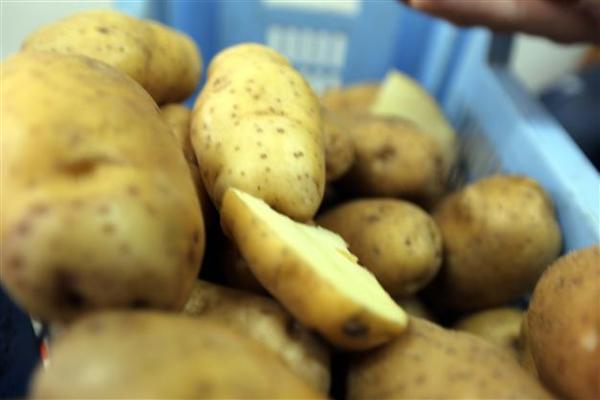Ministers disagree over Turkey’s skyrocketing potato prices
Burak Coşan - ISTANBUL


AA Photo
Ministers disagree over what to do to decrease Turkey’s skyrocketing potato prices, with Economy Minister Nihat Zeybekci signaling a possible license for potato imports and Agriculture Minister Mehdi Eker saying such moves will harm local producers.Food prices have been rising in Turkey, despite the decline in global prices. Food inflation rose to 14 percent in April, while world prices saw 5-year lows, according to the United Nations’ food organization (FAO).
Turkish ministers have conflicting views on decreasing the food prices, and the latest discussion has centered on potatoes, which now cost 5 Turkish Liras per kilo.
Economy Minister Zeybekci signaled the introduction of a possible license for potato imports in order to push local producers to enter their supplies into the market, Anadolu Agency reported on May 7.
“There were incredibly speculative moves in the dried bean prices in 2014. As soon as we made a decision with the Agriculture Ministry to free imports of this product, prices immediately slumped. We did not even start to import any dried beans,” Zeybekci also said in a special interview with Reuters on May 5.
However, Agriculture Minister Eker noted that the average price of one kilo of potato is around 3.6 liras in Turkey’s three largest cities and even as low as 2 liras in several marketplaces.
“There is no problem with the local potato production. Producers sell one kilo of potatoes to retailers for 1.8 liras. Imports can be allowed only if it is a must,” he said, quoted by private broadcaster CNN Türk.
Local producers are against any import license in food products.
Agriculturalists’ Association of Turkey (TZD) Chairman İbrahim Yetkin said some 4 million tons of potatoes were produced in Turkey last year, and dismissed the need for imports.
“We expect a rise in production this year. Freeing imports only discourages local producers, nothing else … Such licenses will further push down the producers’ price, which is already not high,” Yetkin said.
Intermediaries are putting extra costs in building a retail channel between producers and consumers, according to several sector representatives.
They say that any import licenses will affect producers adversely, not intermediaries.
“In normal conditions, the prices will decrease in a couple of months with new yields being circulated into the market,” Yetkin said.
Turkish ministers have conflicting views on decreasing the food prices, and the latest discussion has centered on potatoes, which now cost 5 Turkish Liras per kilo.
Economy Minister Zeybekci signaled the introduction of a possible license for potato imports in order to push local producers to enter their supplies into the market, Anadolu Agency reported on May 7.
“There were incredibly speculative moves in the dried bean prices in 2014. As soon as we made a decision with the Agriculture Ministry to free imports of this product, prices immediately slumped. We did not even start to import any dried beans,” Zeybekci also said in a special interview with Reuters on May 5.
However, Agriculture Minister Eker noted that the average price of one kilo of potato is around 3.6 liras in Turkey’s three largest cities and even as low as 2 liras in several marketplaces.
“There is no problem with the local potato production. Producers sell one kilo of potatoes to retailers for 1.8 liras. Imports can be allowed only if it is a must,” he said, quoted by private broadcaster CNN Türk.
Local producers are against any import license in food products.
Agriculturalists’ Association of Turkey (TZD) Chairman İbrahim Yetkin said some 4 million tons of potatoes were produced in Turkey last year, and dismissed the need for imports.
“We expect a rise in production this year. Freeing imports only discourages local producers, nothing else … Such licenses will further push down the producers’ price, which is already not high,” Yetkin said.
Intermediaries are putting extra costs in building a retail channel between producers and consumers, according to several sector representatives.
They say that any import licenses will affect producers adversely, not intermediaries.
“In normal conditions, the prices will decrease in a couple of months with new yields being circulated into the market,” Yetkin said.
